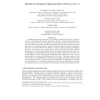328 search results - page 1 / 66 » Static performance prediction of skeletal parallel programs |
PAAPP
2002
13 years 4 months ago
2002
We demonstrate that the run time of implicitly parallel programs can be statically predicted with considerable accuracy when expressed within the constraints of a skeletal, shapel...
IPPS
1999
IEEE
13 years 8 months ago
1999
IEEE
A structured approach to parallel programming allows to construct applications by composing skeletons, i.e., recurring patterns of task- and data-parallelism. First academic and co...
PPL
2008
13 years 4 months ago
2008
Parallel programming has proven to be an effective technique to improve the performance of computationally intensive applications. However, writing parallel programs is not easy, ...
ICPPW
2005
IEEE
13 years 10 months ago
2005
IEEE
High-performance computing is essential for solving large problems and for reducing the time to solution for a single problem. Current top high-performance computing systems conta...
ICCS
2001
Springer
13 years 8 months ago
2001
Springer
: Performance modeling for scientific production codes is of interest both for program tuning and for the selection of new machines. An empirical method is used for developing a m...

